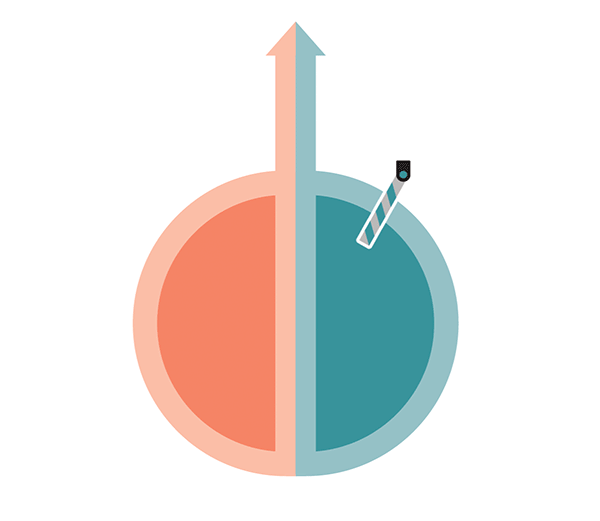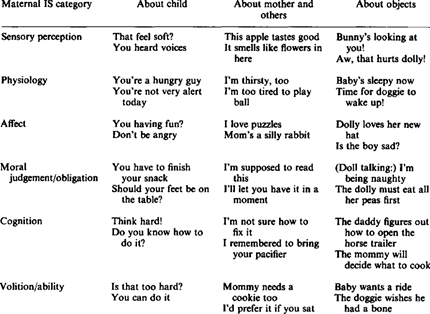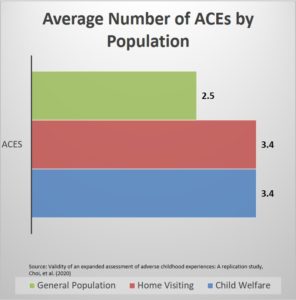
By Gabriel McGaughey and Paige Bintz
Executive function (EF) skills are like an air traffic control system in the brain that helps us manage information, set and work towards goals, and make decisions that help us reach those goals. EF Skills, which can be developed throughout the life-course, are central to navigating distractions, unexpected challenges, and stressful situations while making decisions that contribute to long-term goal attainment.
Resilience, or the ability to overcome serious hardship, is a central concept operationalized, in part, through EF Skills. Building resilience helps children and adults navigate stressful situations and the lingering impact of trauma.Childhood experiences are the foundation for healthy development into adulthood. Adverse Childhood Experiences (ACEs) can cause cracks in that foundation, potentially impairing EF Skills and contributing to less intentional self-regulation. ICFW team members Drs. Mersky and Janczewski co-authored a study finding that parents in home visiting programs reported the same level of ACEs as parents with children involved in the child welfare system.
Parents participating in Children’s Wisconsin Wausau home visiting program face a myriad of complex challenges beyond the legacy of ACEs. 77% of caregivers in that program have reported an alcohol or other drug abuse, mental health, or domestic violence issue. 48% of caregivers screened positive for postnatal depression. Through those challenges, 56% of parents are receiving services and 90% demonstrate positive parent-child interactions, a core component to child health, well-being, and resilience.
How might programs that already reach families further address enhancing executive functioning of parents and children in their programs to promote long-term stability and success?
Children’s Wisconsin, along with two other Children’s Home Society of America partner organizations, is participating in a collaborative feasibility study of the “Executive Functioning Across Generations™” program, funded by Frontiers of Innovations, the R&D platform of the Center on the Developing Child at Harvard University. Developed in 2017 by The Family Partnership (TFP) in Minneapolis, Minnesota, the organizations are working together to adapt the intervention for virtual use in a Healthy Families America home visiting program.

Over the course of 10 virtual sessions, parents learn about brain science and familiarize themselves with the types of activities that help foster brain development and self-regulation in their children through a language-based curriculum. Specifically, there will be an increase in knowledge of brain science, internal state words, theory of mind, serve and return, and personal narratives (BITSN’s). These are all key functions of brain development in children. Parents will learn how to recognize, model and respond to Internal State Words (ISWs) as part of a supportive relationship with their child. ISWs are important because they are used by children in order to express themselves by describing thoughts, feelings and perceptions. This helps them to tell stories about events that have affected them emotionally (see chart).
Home visitors coach families, encourage further learning, and provide teaching tools, like storybooks that use ISW-based language. There will also be activities and handouts for the parents to practice skills with their children in between the sessions. This project has a greater impact with the implementation of a two-generation approach because it allows for more alignment with the goals and more stability in the family unit. The skills learned and the impacts made can continue to affect more generations and create a “domino effect” of positive development.
In order to measure the impact of the curriculum, Minnesota Executive Functioning Scale (MEFS), developed at the University of Minnesota by Dr. Stephanie M. Carlson and Dr. Philip Zelazo, will be used. The app is a quick, “game-like” measure of executive functioning for anyone over the age of 2 that features audio and picture-based prompts. This administration should only take 15 minutes to complete virtually. Overall, the MEFS provides a direct behavioral measure of executive functioning skills which are vital for the development of a child’s social and emotional wellbeing.
By increasing the use of internal state words and a personal narrative, Executive Functioning Across Generations™ helps to foster better parent/child relationships, which is central to child resiliency and being able to adapt to challenges. The ICFW is looking forward to collaborating with The Family Partnership, Nebraska Children’s Home Society, Children and Families First of Delaware, and the Frontiers of Innovation at the Center on the Developing Child at Harvard University to share our lessons learned as we go through this process.
Learn More:
Frontiers of Innovation: An R&D platform designed to accelerate the development and adoption of science-based innovations that achieve breakthrough impact at scale.
Executive Functioning Across Generations
Leveraging A Two-Generation Approach To Improve Executive Function in Families


